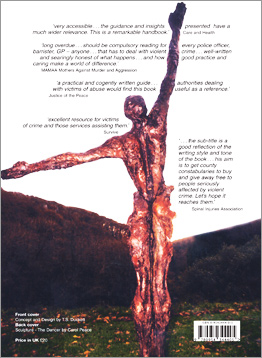
Media contributions and commentaries on crime victim, project work, strategic development and safeguarding policy work from all sectors and national governments.
![]()

Prison Service Journal – Issue 160 – July 2005
Review of Surviving Violent Crime and the Criminal Justice Injuries Compensation Authority: A Guide for Progress and Living Well
Simon Duckett
Much is expressed in the discussion about crime and justice about looking after the needs of victims. The government has a highly developed commitment to victims of crime and there are an increasing number of initiatives in their name. The sad reality however is that the real needs of victims as people can easily be neglected in the instrumental approach to them as witnesses. Look at what has happened to those who report an incident of rape. The conviction rate is at an all time low with some 5% ending up with a finding of guilt. More and more victims of crime are dissatisfied with the justice process. The priority for the justice system, its practitioners and its performance measures is to narrow the gap between reported crime and the number of cases that come to trial. Too many offences are unresolved.
The book is full of valuable information painstakingly researched and imaginatively assembled. It is a reference book on issues such as trauma, the justice system, health agencies, advocacy, balanced healthy living and for setting up services for those affected by crime. It encourages all of us to be responsible and active in making vulnerable groups socially and politically active. It is through the authentic voice of victims who have moved through their experience of trauma to support the provision of realistic and personal support for others that we will begin to meet the needs of those damaged through crime.
© May 2005 Mr Tim Newell: Former Prison Governor active Restorative Justice Facilitator
Justice of the Peace, September 2003
This is an informative handbook for people who have experienced crimes of violence or abuse or other forms of injustice and who wish to take their cases to the Criminal Injuries Compensation Authority for State compensation. It is a paperback of 477 pages and is therefore quite a detailed book. It is a practical and cogently written guide for the individual who has been traumatized by some act of aggression, explaining how to proceed with their claim.
The first half of the book deals in a sensitive way with the practical and personal problems experienced by such a victim and how best to deal with these. The author has a background in Social Services and he writes in a knowledgeable way about how the victim should engage with the authorities when explaining what has happened.
There is an excellent website linked to the book which can be found at www.officium.org.uk which I visited and was impressed by the sensitive and practical approach adopted.
At the back of the book is a detailed directory of useful contact numbers, names and addresses.
In my opinion, authorities who are dealing with victims of abuse would find this book useful as a reference for individuals who have experienced violence or other injustice.
© Valerie Sterling, Barrister 2003